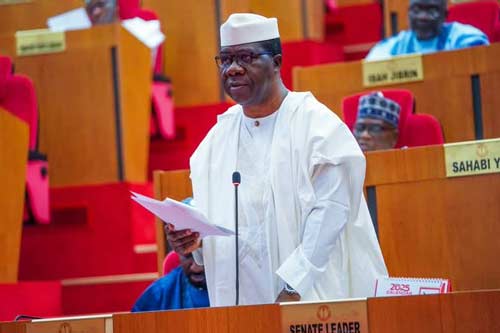Senate Leader: Tax Reform Bills To Be Considered After Easter And Eid Holidays

Leader of the Senate, Opeyemi Bamidele, said the upper chamber of the National Assembly was looking into all issues of public concern relating to the Tax Reform Bills, 2024.
Bamidele assured that the senate will consider the bills immediately after the Eid and Easter holidays.
Bamidele, who is senator for Ekiti Central, equally revealed that the review of the Constitution of the Federal Republic of Nigeria, 1999 (as amended) was still on course, saying the process will lead to a more efficient and responsive governance system when concluded.
He made the revelations in Ado Ekiti on Thursday during an empowerment programme that benefited no fewer than 5,000 of his constituents across five local government areas in Ekiti Central Senatorial District.
Present at the programme were Ekiti State Governor, Mr. Biodun Oyebanji; Deputy Governor, Chief Christianah Afuye; Speaker of Ekiti State House of Assembly, Rt. Hon. Adeoye Aribasoye; and Ewi of Ado-Ekiti, Oba Rufus Adejugbe (Aladesanmi III), among others.
During the exercise, Bamidele extensively reflected on diverse legislative initiatives the senate had promoted since its inauguration on June 13, 2023 to ensure the sustainability of the country’s democracy and stability of the economy.
Persuaded by the urgent need to strengthen the country’s economy, Bamidele observed that the upper chamber had focused mainly on the development of legal frameworks “to stabilise the fiscal and monetary spaces; prioritise security; address consumer price inflation and create more functional governance structures”.
The senate leader also specified the prominent role he had played in the formulation and prioritisation of several important legislative initiatives, which, according to him, included the introduction of the Tax Reform Bills 2024.
He explained that the tax reform bills “are game changers that will redefine and transform our country’s fiscal environment significantly. When enacted, the bills will address inequality and injustice that characterise our tax system”.
Under the proposed tax regime, Bamidele stated that employees earning N1,000,000 or below per annum “will be completely relieved of tax burden. Besides, all businesses with N50 million capital or below will now enjoy tax exemptions. Value Added Tax will no longer be placed on exports and essential consumptions by the masses”.
Bamidele stated, “The essential goods and services include food items, education, transportation and medical treatment, among others.
“The bills further propose 27.5 per cent in 2025 and 25 per cent in 2026, which, according to development data, is conservative compared to 27 per cent in South Africa and 30 per cent in Kenya.
“The House of Representatives has successfully passed the Tax Reform Bills 2024. The senate is looking into all areas of public concern. When we resume plenary after the Eid and Easter holidays, the senate will consider the bills again; resolve all areas that Nigerians have expressed concerns and pass the bills purely in the national interest.”
Bamidele also emphasised the resolve of the National Assembly to review the Constitution of the Federal Republic of Nigeria, 1999 (as amended), saying the legislature has never relented in efforts to recraft the country’s constitution.
Bamidele explained the rationale behind the amendment, saying it is designed to evolve “a more efficient and responsive governance system that will serve the interests of all, regardless of political bias, ethnicity or religious affiliation”.
According to him, “The senate will continue to provide the legal and regulatory environment that will incentivise foreign direct investments. We are convinced that this initiative will not only positively impact our foreign exchange earnings, but also stabilise the macro-economic landscape.
“The initiative will, no doubt, boost the country’s revenue generation; improve the living conditions of the people and increase the country’s gross domestic product (GDP).”
He added that the efforts were exemplified in the amendment of the National Social Investment Programme Agency (Establishment) Act, 2024 “to establish an effective and accountable structure for service delivery, and adequate coordination among relevant agencies of government”.
He said, “The Act now guarantees the sustainability of the NSIP as a valuable tool for poverty alleviation in Nigeria. We have provided necessary legislative frameworks and strengthened public institutions with capacities to deepen social equity and promote economic growth.
“The frameworks are also designed to foster environmental sustainability; encourage greater access to qualitative health care; discourage social dislocation; eliminate terrorism and insecurity and reduce the gap between the haves and the have-nots.





